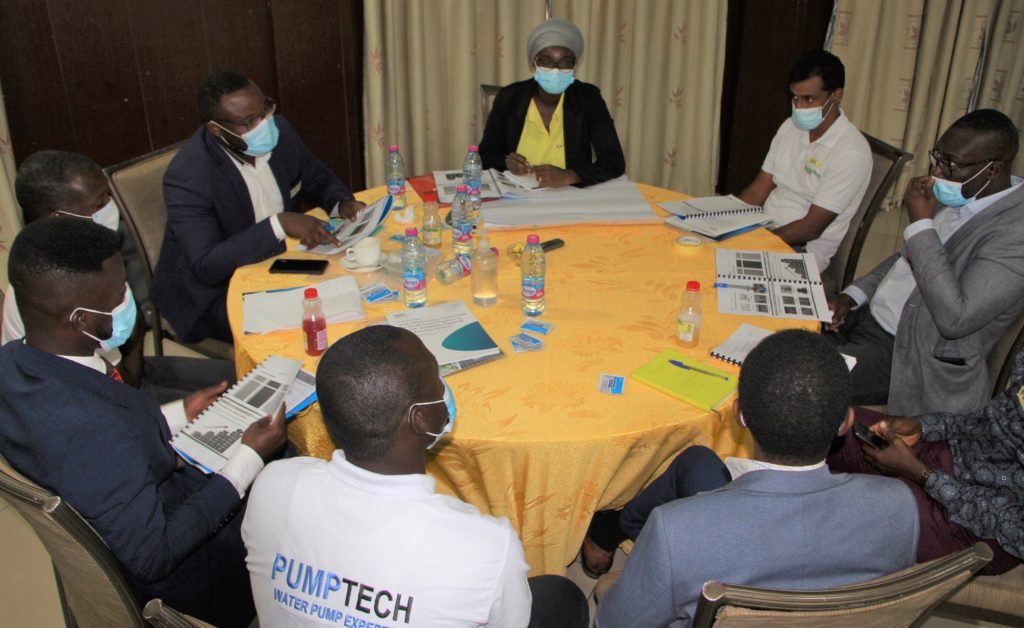In October 2021, the Feed the Future Innovation Lab for Small Scale Irrigation (ILSSI) hosted, in collaboration with our research partners, our latest small scale irrigation dialogue platform meetings in Ghana and Ethiopia. These meetings are part of the Small Scale Irrigation Multi-stakeholder Dialogue Spaces, which we first established in project countries in 2019, that bring stakeholders together to encourage collective thinking across sectors and explore new opportunities and solutions to scaling farmer-led irrigation.
Irrigation for climate-resilient cocoa production
In Ghana, the recent meeting focused on the cocoa sector, and was co-convened with the International Institute of Tropical Agriculture. The overall goal of the cocoa-focused multi-stakeholder dialogue is to contribute to the sustainability of the cocoa system through a market approach to improved water management and irrigation of cocoa.
This first meeting focused on the cocoa sector and explored producer market segmentation, agricultural water management, and small scale irrigation suitability for cocoa production. Participants represented private sector companies, such as ECOM Trading, PEG Africa, and PumpTech; government stakeholders, including the Ghana Cocoa Board and the Cocoa Health and Extension Division; and research partners such as the Cocoa Research Institute, Water Research Institute, Ministry of Food and Agriculture, and Ghana Irrigation Development Authority.
In addition to presentations on the need for, as well as the potential and suitability of, irrigation, participants also discussed approaches to ensuring equitable and affordable access to irrigation for smallholder cocoa producers. Participants also networked and set the foundation to collaborate toward a climate-resilient cocoa sector. A meeting report includes links to all presentations made.

Leveraging offtake markets to unlock irrigation
In Ethiopia, our recent event focused on the role of offtake markets in unlocking small scale irrigation investments. We brought together stakeholder including cooperatives, lead firms, and digital marketing companies to learn from their experiences. More than 28 stakeholder organizations attended the event, either physically or virtually.
Through their discussions, stakeholders found that actors in offtake markets, such as agribusinesses and start-ups, cooperatives, processors, exporters, and wholesaler traders, have multiple roles to play in unlocking investments in small scale irrigation. For example, they can help improve access to inputs, irrigation technologies, loan and credit services, technical support, markets, as well as cold chain and other facilities. Likewise, the enabling environmentis critical in supporting investments in and marketing of small scale irrigation. Notably, local and export market demand, favorable conditions for irrigated production, economic return, policy support, tailored services provided by micro-finance institutions, and information and communications technology platforms all can help create opportunities for greater investments in small scale irrigation.
Stakeholders identified current challenges that hamper offtake market actors’ ability to accelerate small scale irrigation. These include the fact that some aspects of irrigated fruit and vegetable markets are largely informal, with high risks and price fluctuation, low transparency, and unbalanced decision-making power between actors. Limitations in accessing inputs, technology, facilities, financial services, and markets to ensure return on investment along with capacity gaps on contract enforcement, certification, international marketing, operation, and management of cold store facilities and irrigation technologies are also among the challenges. Policy and institutional barriers were also identified, including those related to tax and duty exemption processes for irrigation technologies, packaging material regulations, financial regulations on mobile money transactions, and limited coordination between key institutions.
Finally, discussions highlighted a number of opportunities, including optimal use of agro-ecology for growing fruits and vegetables, irrigation of high-value crops to increase farmers’ revenue by enabling more harvests per year, and increased donor and project interest in supporting small scale irrigation development and creating access to services and technologies for smallholder farmers. The revision of Ethiopia’s agriculture and rural development policy was highlighted as an opportunity to further create the desired enabling environment. A meeting report details further insights from discussions.


